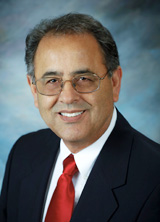Halls of Fame
 "America is not like a blanket--one piece of unbroken cloth, the same color, the same texture, the same size. America is more like a quilt-many patches, many pieces, many colors, many sizes, all woven and held together by a common thread."
"America is not like a blanket--one piece of unbroken cloth, the same color, the same texture, the same size. America is more like a quilt-many patches, many pieces, many colors, many sizes, all woven and held together by a common thread." The Rev. Jesse Jackson
Ruben Barron, Ed.D.
Ruben Barron came to Santa Ana College in 1969 after completing a tour of duty in the U.S. Army that took him to Vietnam during the Tet Offensive of 1968.
Upon returning to the family home on the south side of Santa Ana he was met with the same expectations he grew up with: you were either working or studying. "As the oldest son in a family of nine children, my father expected me to help support the family, so I worked from 4 p.m. - midnight and gave my father my check. With this obligation fulfilled, I used the G.I. Bill to pay tuition and books at Santa Ana College, where I took classes during the day, including summer school."
A daunting schedule, but Ruben was well-acquainted with hard work, growing up in a migrant family that had moved to the United Stated in 1955, and picking crops throughout the San Joaquin Valley while living in make-shift wooden shanties.
In a story published in The Orange County Register in 2008, Ruben said, "In the fall, the start of school was determined by when the ripe fruit had been picked, not by a school calendar.
"After school, we went directly home to do chores that continued through week-ends and long hot summers. Life was definitively better in Mexico where we had farm animals, rode horses, and played leisurely. It was nearly impossible for us kids to understand that our life in the present had to be so difficult in order for us to have a better future.
"Growing up we encountered the obstacles of poverty and minority status that immigrant families often face: from home, the need to work; from school, low expectations and poor counseling, if any; and from society, the constant reminder that we were outsiders.
"Our strong family values helped us focus on the opportunities and dismiss the stereotypes."
One opportunity presented itself in 1970, when Ruben went to the office of SAC President John E. Johnson, who greeted him warmly and "convinced me that I had a chance to do something with my life. The fact that he took so much time just to talk with me, to encourage me, made a huge impression."
Other opportunities included taking a Spanish class from an instructor who had very high expectations, and a Black Studies class. "I always felt it was important to learn and work with people from different backgrounds; education is not just about content; it's about expanding your horizons. It's hearing about the beliefs, experiences and attitudes of others. I remember being the only brown face in that Black Studies class, and learning about the poet Langston Hughes. An Asian student and I also were in friendly competition in that class."
Then a friend suggested that he change his major from business to education, an idea that complemented his philosophy of education, and life.
"The civil rights leader Jesse Jackson said, 'You cannot teach what you do not know; you cannot lead where you do not go.' I think that's a loaded quote: educators need a broad background, to continue to be open to new experiences and ideas, and to be well connected to the community."
Upon graduating with honors in 1971, Ruben transferred to California State University, Fullerton, where he earned a B.A. and his teaching credential just two years later. He began his teaching career in the La Habra City School system. A master's degree from Cal State Fullerton followed, and then his Ed.D. from Arizona State University in 1993.
After serving as a classroom teacher for seven years, he became Director of Bi-lingual Programs for the La Habra City School District and then a principal in the McFarland Unified School District in Kern County, CA.
His career trajectory continued toward those administrative positions in which he could provide influential leadership on wide-ranging educational issues, including chairing a number of accreditation teams, including Lacy Juvenile Hall.
Although officially retired after a career that spanned more than 30 years, Ruben's work is not yet done: he not only chairs several accreditation teams, he also continues to be active in his church and community, and is a candidate for the North Orange County Community College School Board. He also is a senior consultant with a group that conducts searches for school superintendents.
After years of participating in organized tennis competitions, he now plays weekly games of doubles tennis, and golf, when time allows.
Ruben also values being able to swim, a skill that he learned at Santa Ana College after a friend saved his brother from drowning in an irrigation ditch while they were living in Fresno. "And I made sure our son learned how to swim, too," he said.
Ruben and his wife, Socorro, also an educator, met when they were students at Santa Ana Valley High School and married in June 1970. They have one son, who inherited their passion for education: after graduating with a degree in English Literature from Point Loma Nazarene University in San Diego, he taught Business English in Japan.
According to Socorro, "Ruben likes to be challenged to serve where needed," so it is likely that his list of accomplishments will continue to grow as he strives to live up to the core values his parents instilled in him: responsibility, hard work, loyalty to Christian principles and values, and the people you love.
